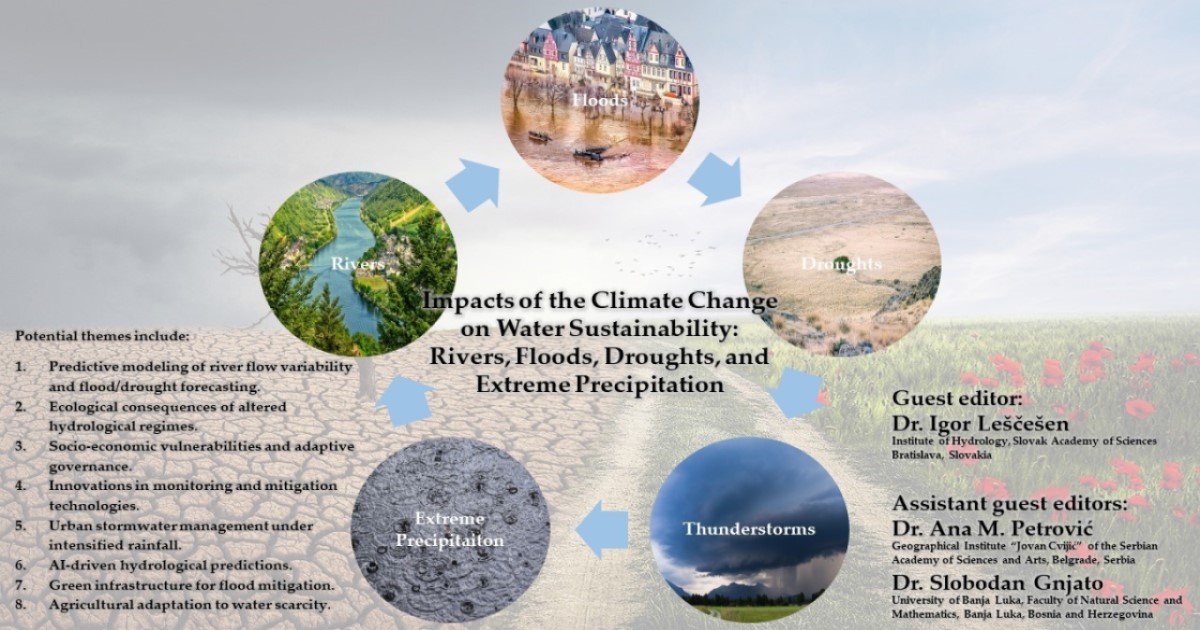Impacts of Climate Change on Water Sustainability: Rivers, Floods, Droughts, and Extreme Precipitation
A special issue of Sustainability (ISSN 2071-1050). This special issue belongs to the section "Sustainable Water Management".
Deadline for manuscript submissions: 31 March 2026 | Viewed by 5363

Special Issue Editors
Interests: hydrology; climatology; environmental science; natural disasters
Interests: physical geography; natural hazards; environment; hydrology of torrents; torrential floods; soil erosion; water resources
Special Issue Information
Dear Colleagues,
Climate change is significantly altering hydrological systems, intensifying extreme events such as floods, droughts, and erratic precipitation patterns. These changes pose critical challenges for water sustainability, requiring a deeper understanding of shifting river flow regimes, increasing flood risks, prolonged droughts, and their socio-ecological consequences. This Special Issue of Sustainability focuses on advancing research on climate-driven disruptions to water systems by using innovative methodologies, improved climate and hydrological models, and state-of-the-art statistical and machine-learning approaches. We welcome contributions from diverse geographic regions that explore predictive models of river flow variability, flood and drought forecasts, and the socio-economic impacts of hydrological extremes. Studies emphasizing adaptive management strategies, green infrastructure, and AI-driven hydrological predictions are particularly encouraged. By integrating interdisciplinary research—from physical sciences to socio-economic analyses—this Special Issue aims to reduce uncertainties in climate impact assessments and support resilient water resource management. We invite original research articles, case studies, and reviews that provide insights into regional vulnerabilities, ecosystem responses, and governance frameworks for climate adaptation. Through this collective effort, we seek to enhance global strategies for mitigating risks and building sustainable climate-resilient water systems for the future. Potential themes include, but are not limited to, the following:
- Predictive modeling of river flow variability and flood/drought forecasting.
- The ecological consequences of altered hydrological regimes.
- Socio-economic vulnerabilities and adaptive governance.
- Innovations in monitoring and mitigation technologies.
- Urban stormwater management under intensified rainfall.
- AI-driven hydrological predictions.
- Green infrastructure for flood mitigation.
- Agricultural adaptation to water scarcity.
We look forward to receiving your contributions.
Dr. Igor Leščešen
Dr. Ana M. Petrović
Dr. Slobodan Gnjato
Guest Editors
Manuscript Submission Information
Manuscripts should be submitted online at www.mdpi.com by registering and logging in to this website. Once you are registered, click here to go to the submission form. Manuscripts can be submitted until the deadline. All submissions that pass pre-check are peer-reviewed. Accepted papers will be published continuously in the journal (as soon as accepted) and will be listed together on the special issue website. Research articles, review articles as well as short communications are invited. For planned papers, a title and short abstract (about 250 words) can be sent to the Editorial Office for assessment.
Submitted manuscripts should not have been published previously, nor be under consideration for publication elsewhere (except conference proceedings papers). All manuscripts are thoroughly refereed through a single-blind peer-review process. A guide for authors and other relevant information for submission of manuscripts is available on the Instructions for Authors page. Sustainability is an international peer-reviewed open access semimonthly journal published by MDPI.
Please visit the Instructions for Authors page before submitting a manuscript. The Article Processing Charge (APC) for publication in this open access journal is 2400 CHF (Swiss Francs). Submitted papers should be well formatted and use good English. Authors may use MDPI's English editing service prior to publication or during author revisions.
Keywords
- climate change
- water sustainability
- flood risk management
- drought resilience
- extreme precipitation
- hydrological modeling
- river ecosystems
- hydroclimatic extremes
- socio-ecological impacts
Benefits of Publishing in a Special Issue
- Ease of navigation: Grouping papers by topic helps scholars navigate broad scope journals more efficiently.
- Greater discoverability: Special Issues support the reach and impact of scientific research. Articles in Special Issues are more discoverable and cited more frequently.
- Expansion of research network: Special Issues facilitate connections among authors, fostering scientific collaborations.
- External promotion: Articles in Special Issues are often promoted through the journal's social media, increasing their visibility.
- Reprint: MDPI Books provides the opportunity to republish successful Special Issues in book format, both online and in print.
Further information on MDPI's Special Issue policies can be found here.







